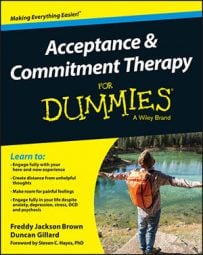Use the following ten Acceptance and Commitment Therapy (ACT) tips to help you live a life defined by your values and not by your mind:
Practise mindful awareness: Being aware of what you think and feel as you go about your daily life helps you to connect with the world in which you live. It's all too easy to spend lots of time in your mind, wondering, worrying, ruminating and planning, which, while sometimes useful, can also disconnect you from the real world.
Be open: Being open to all your experiences, even when they're not very nice, enables you to get on with doing the things you want to be doing rather than trying to avoid or get rid of the things you don't want in your life.
Put your mind on a lead: Your mind can dominate you and push you around. If you let it, it can try to make you stop doing things you want to do and do things you don't want to do.
Remember that your mind is a useful tools for evaluating and analysing, but it can also get in the way of living in line with your values. Use mindfulness exercises to gain some distance from the content of your mind so that negative or unhelpful thoughts dominate you less.
Actively pursue your value-based goals: In ACT, doing the things that matter in life means first being clear about your values – those things that matter to you most and instruct how you want to behave – and then setting SMART goals based on them.
Practise empathy and compassion: From time to time, try to put yourself in another person's shoes. When you understand even a little of how another person feels, you can respond to him more effectively, and do something to ease his suffering in some small way.
Be friendly: Smile and the world smiles with you. Be friendly and behave positively towards others and they'll respond to you in the same way.
Be helpful: Co-operation is what holds a society together. Helping others makes both you and the recipients feel good. And what goes around comes around: if you assist someone in need, they'll want to assist you in the future.
Listen to others: Listening is an underrated social skill! Too often your mind jumps in and starts spouting off about this and that. Try to focus on what someone's saying and hold off responding until you sense that he wants you to do so. Just listen and absorb.
Be playful and try new things: You can get locked into old patterns of behaviour that don't take you in valued life directions. To establish new patterns – or no patterns at all! – have a go at something you've never tried before; take yourself out of your comfort zone and shake yourself up a little. For example, if you value being healthy and have always gone jogging on a Thursday night, take up jive instead. You'll still be keeping fit but doing so with new people, and getting the steps wrong is simply an opportunity for laughter.
Give yourself reminders: Losing contact with and forgetting your values during the course of your busy life is all too easy. To keep them in the forefront of your mind, write down your core values on a piece of paper and put it in your wallet or purse, or stick it on the fridge. Alternatively, you can email the list to yourself periodically.

